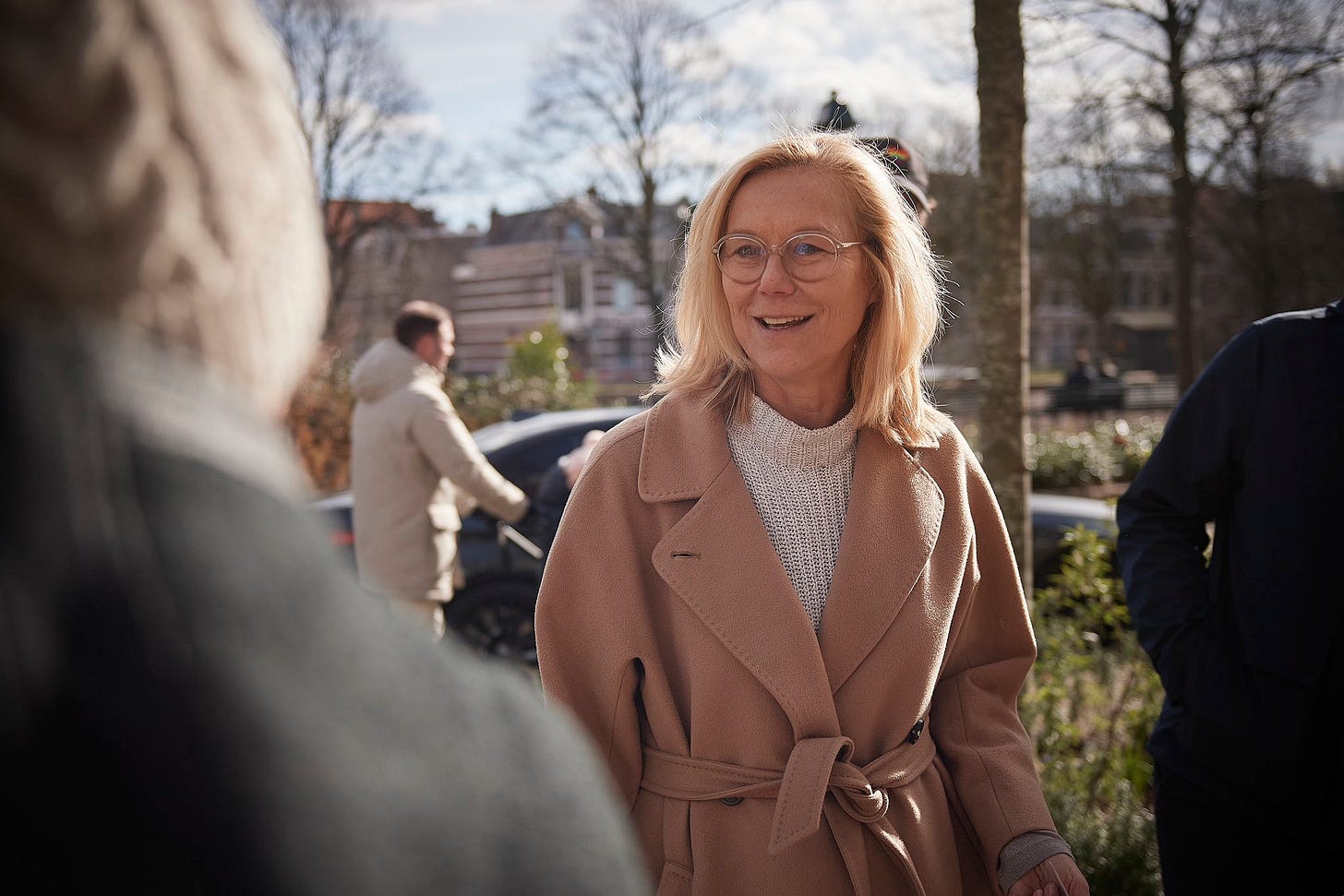Sigrid Kaag, Mongolia’s new quota limits, and some trash talk in Pakistan: Everything you need to know about women in politics from July
#WomenLead (Issue 141): Your monthly round-up on women in politics
Hello, and welcome to the July 2023 edition of #WomenLead!
A very warm welcome to all new subscribers who have signed up in recent days to this newsletter. Thank you for signing up!
We are here, fresh after a visit to La-La-BarbieLand, thinking about why President Barbie and all the judge Barbies belong only to the Pink Utopia land, and not the real world. But of course, all it takes is a quick read through any of our editions, and we are back to reality.
In this edition, we bring you updates from India, Mongolia, Netherlands, Pakistan, Sierra Leone and Zimbabwe. In case you missed last month’s edition, you can read it here.
Election Watch
Tracking women among candidates and winners
🇸🇱 Sierra Leone: Women will make up 30.4 percent of all MPs in Sierra Leone’s newly-elected Parliament. This is up from 14.5 percent earlier. This significant jump is thanks to a new law that mandates a 30 percent quota for members of Parliament.
🇿🇼 Zimbabwe: The African nation will go to polls next month to elect a new President and members of Parliament. There are only 70 women among the 637 candidates who will be contesting these polls, ZimFact reported. The share of women contesting the Parliamentary polls is lower this year, as compared to the previous polls. The same is true for local elections, where women make up 14 percent of candidates this year, as compared to 17 percent previously. There is only one woman among those running to be President, but not before winning a court case to be allowed to contest first.
Read more: Zimbabwean women are reduced to cheerleaders in the upcoming election, activists say, Associated Press
Leaders
Updates about women leading countries
Earlier this month, Sigrid Kaag, the Deputy Prime Minister of Netherlands, announced that she was quitting politics.

Kaag’s decision comes ahead of fresh elections due in November following the incumbent Prime Minister Mark Rutte’s resignation. Kaag said that she was taking this decision due to the death threats she had received, El Pais reported. These threats were taking a toll on her family. "My work has been a heavy burden for my husband and my children…I'm not quitting because my security is an issue for me. But it is for them. I would like it for them if things would quieten down,” Reuters reported citing what Kaag told a Dutch daily Trouw.
2023 has been an exceptional year seeing women leaders at the very top in different parts of the world not just stepping down from their roles, but often quitting politics altogether. Earlier this year, former New Zealand PM Jacinda Ardern and Scotland’s former First Minister Nicola Sturgeon also announced their decisions to resign from politics.
Following Kaag’s announcement, two more prominent Dutch women leaders announced their decision to quit politics - first, Liane den Haan, an independent MP, said she wanted to quit politics over the ugly atmosphere. Later, Carola Schouten, also a Deputy Prime Minister and caretaker Minister for Poverty Policy, also announced her decision to step down.
Read more: Kaag hopes the hatred, harassment she experienced won't deter women from politics: NL Times
On-the-job updates
Spotlighting women’s experiences in political office
Death threats, unfortunately, are not uncommon in politics. Recently, women councillors in India’s Tamil Nadu staged a sit-in protest in the mayor’s office alleging that they had received death threats from T.P.M. Mohideen Khan, a former state minister. The women and Khan both belong to the same party, the Dravida Munnetra Kazhagam (DMK). The issue is internal factional politics – the women allege that when they questioned Khan over the choice of candidates for the council committee, he responded by issuing a death threat to them.
When criticised by members of the Opposition for “bulldozing” bills in the Parliament, Pakistan’s Federal Minister for Defence Khwaja Asif decided to take the road frequently travelled - of misogyny and personal attacks - rather than indulge in a more responsible debate. He claimed that women members of the Opposition were “garbage”. But it wasn’t just that. Mr. Asif claimed that “depraved women should not lecture on chastity” and that the women members were the “remains and ruins” of former PM Imran Khan. He went on to assert that this was “garbage that has to be cleaned.”
That’s a lot of music to nobody’s ears. He later on defended himself saying these were not gender-specific, and were aimed at the entire Opposition, not just women, but – wait for it – the men just “didn’t see that these remarks were for them as well”.
Policy Watch
Because policy shifts matter
Mongolia, where Parliamentary elections are due next year, has recently amended its Constitution, paving the way for significant political shifts. For one, the size of its legislative body has been increased from 76 to 126. It will also use a mixed electoral system.
Additionally, it has increased the quota for women among party candidates from 20 percent to 30 percent, and is considering increasing this to 40 percent, The Diplomat has reported. Is it likely to make a dent? Read the report for more.
Shout-out
A note of gratitude for those tracking gender gaps in politics
In this edition, we would like to acknowledge the work of Fawcett Society, a non-governmental organisation based in the United Kingdom that actively works to campaign for gender equality, with a focus on improving women’s representation in politics at all levels. They track gender gaps in UK politics, and come out with important data and research that helps shed light on critical gaps, such as this recent study on women’s representation in local councils, or this one on women’s experience of selection and election in UK’s Parliament. Read more about their work here.
Reading List
The more one learns, there’s only more to learn
“We must dismantle barriers to women’s political participation. Here’s why”: UNDP
“It’s Not Democracy Without Women in Positions of Power”: World Politics Review
“Men vastly outnumber women in studying legislative politics”: Rice University
“What women political candidates think of their local media coverage”: Nieman Lab
“The 2024 Republican presidential field keeps growing. So why aren’t there more women?”: Associated Press
That’s a wrap for July! Liked this edition? Then press the ❤️ button and show us some love! And please, please do share this with a friend or on your social media accounts. There’s frankly nothing quite like reader love and endorsement, so please keep it coming! Thank you!
Disclaimer: #WomenLead is a non-partisan newsletter produced in a personal capacity, and does not reflect any institutional affiliation/opinion. In case of any questions, please drop in a message at womenlead.project@gmail.com





